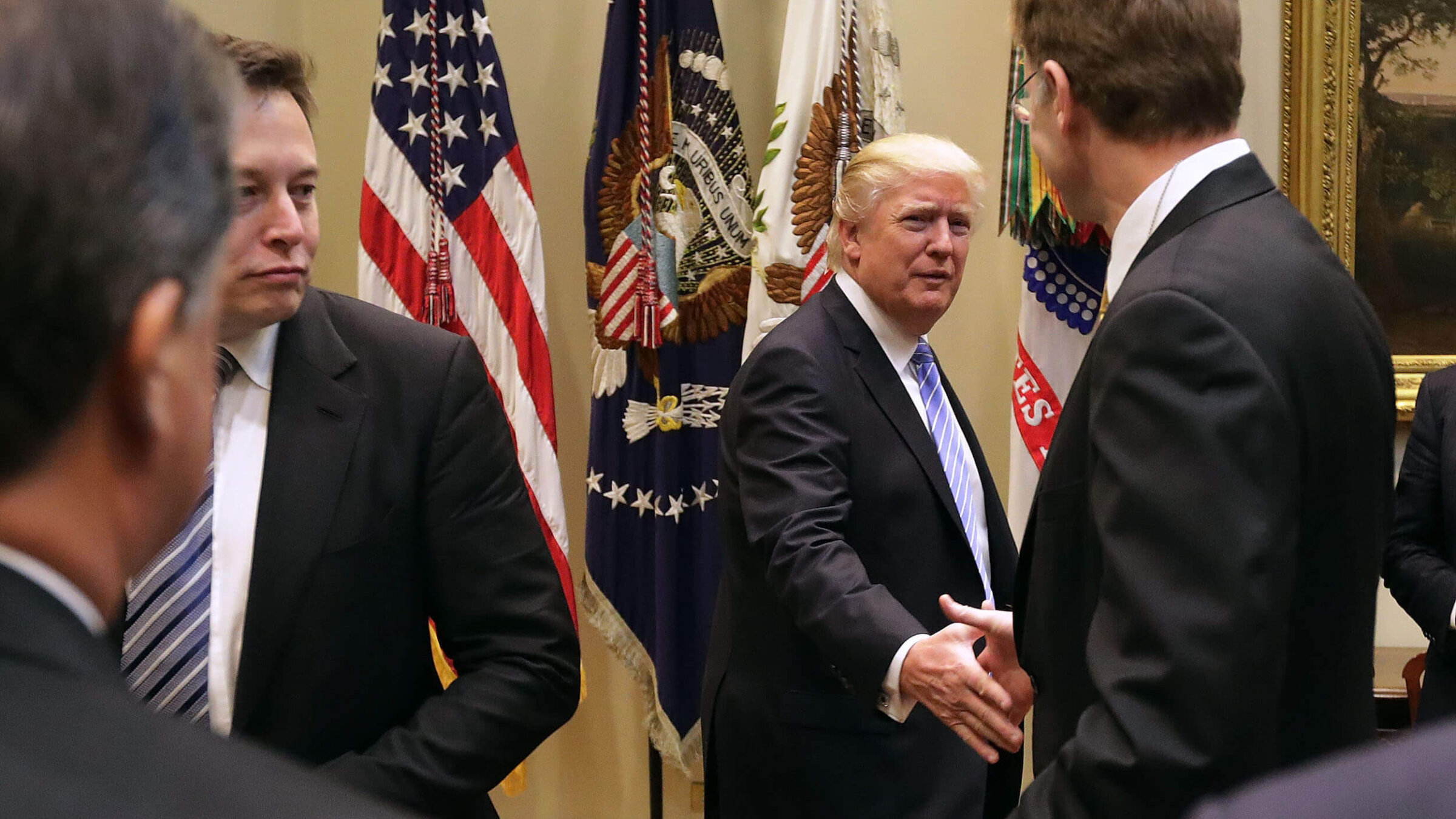Elon Musk and Donald Trump want us to live in conspiracy land — you can guess who the scapegoats will be
Conspiracy theories and antisemitism have always gone hand in hand

Elon Musk and former President Donald Trump on January 23, 2017 in Washington, D.C. Photo by Chip Somodevilla/Getty Images
The point of a conspiracy is to convince you that something that is not real is true. People reach for conspiracy theories to explain things that they can’t understand, or that are beyond their control. And they fall for conspiracies pushed by the powerful — who deploy them not to make sense of things, but to take and keep control.
 If people don’t know what to believe, why shouldn’t they believe the person who is telling them what they want to hear?
If people don’t know what to believe, why shouldn’t they believe the person who is telling them what they want to hear?
I thought of this on Monday night listening to Elon Musk, the richest man in the world, conduct an interview on X — formerly Twitter, the social media platform Musk owns — with former President Donald Trump. It was conspiracy central, and it boded ill for Jews.
Musk kicked off the conversation with what was, in all likelihood, a conspiracy, claiming that the reason people could not access the interview feed for some 40 minutes was because X had been hit by a cyberattack. This was, per a report citing Musk’s own employees, untrue. Musk then suggested that the theoretical attack showed the lengths to which Trump’s enemies would go to stop people from hearing from the former president.
Perhaps, in the grand scheme of things, this was a modest untruth. Still, it was telling in how openly it showed the willingness of two of the most powerful men in the world — both of whom have long records of antisemitic rhetoric — to treat facts as not just irrelevant, but an impediment their followers should resent.
The overarching theme of the conversation was the idea that things are not what they seem. Technology fails? It’s an attack, not incompetence. The country faces vague but menacing national security threats? They’re worse than you know or could imagine, and you should know by now who the only person who can help is. Worried about escalating violence? It’s criminals from elsewhere running into the United States — just trust us, and don’t ask for specifics.
At one point, Trump alluded to shadowy figures who control the government, although he said that naming their names would be giving them too much credit. (The oddness of this claim coming from a man who actually spent four years running the U.S. government — and is seeking to do so again — would be baffling, except in the realm of conspiracy, where one of the most powerful people in the country can claim that the Justice Department is after him not because of alleged crimes, but for political purposes.)
Trump said more than once that the real threat to the United States is enemies “on the inside.” He did not say who, leaving the listener to guess the identity of these people who walk among us, but remain distinct, apart.
According to these two men, nothing is as it seems and nobody can be believed. Only they, Musk and Trump, would tell you the truth.
We’ve seen this show before. It tends to go badly for Jews. If you’ve ever encountered an antisemitic stereotype in your life, you know who those inside enemies behind the government are supposed to be. On X, some baselessly suggested that Hungarian-born billionaire philanthropist George Soros was behind the cyberattack that delayed the conversation, while others said it was the doing of “globalists” — a word long understood to be antisemitic, even if some who use it deny that connotation — trying to silence Trump and Musk.
Part of the trouble is that in a sea of lies, many of which may seem innocuous, the poison of the truly dangerous can come off as almost silly, not worth mentioning.
For example, it is almost entertaining to think that a conversation Trump purportedly had with Putin, which he brought up to illustrate his claim that the Ukraine war would have never happened had he been in office, went like this: Trump threatened consequences to an invasion, “Putin said, ‘no way,’” and Trump replied, ‘way.’”
Perhaps there’s no real harm to imagining this interaction, to picturing Putin and Trump negotiating war in the same language that teenagers might use to exchange gossip. But there is danger in thinking that Trump is right in alleging — despite President Joe Biden’s own attestations — that Harris replacing Biden as the Democratic Party’s candidate was a coup.
Who pulled off this coup? Who funded it? They don’t need to propose a (false) answer, because they expect, if you’re listening, you already know.
It is a well-proven fact that a conspiratorial society is often a dangerously antisemitic one. If Musk and Trump have their way, that’s where we’ll all live: in a world where any social ill can be explained by blaming ill-defined “globalists,” the media, and, of course, Soros.
It isn’t only bad for Jews, of course, to live in a distrustful and conspiratorial society. But it is uniquely bad for Jews, in that we tend to end up the scapegoats in such a situation, with predictably grim results. (Trump evidently does not recognize or care about this danger, as he once again reiterated that Jews who plan to vote for Harris need to have our heads examined — which is to say, if she wins, we Jews who voted for her, crazy and disloyal, will be in no small part to blame.)
“Sometimes,” Musk said, speaking of undocumented immigration, “you have to wonder, ‘is it real or not?’” And that is indeed the project that Musk and Trump aimed to advance in their rambling, nonsensical conversation. To make people wonder what’s real and what’s not; to make them lose trust in their press, their elections, their governmental institutions and their neighbors.
When nothing is real, anything can be real, and so Musk and Trump can create reality as it suits them. Pity for those of us left to live in it.

















